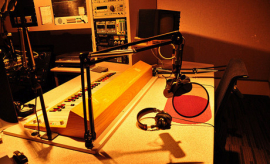
While the South African National Editors’ Forum (SANEF) has lauded the respect afforded to media rights and freedom of expression in South Africa, the body says efforts must be intensified to safeguard these hard-won rights.
Wednesday marked World Press Freedom Day, which was observed under the theme, 'Shaping a Future of Rights: Freedom of Expression as a Driver for all other Human Rights'.
SANEF said it is pleased to note that South Africa ranked 25th out of 180 countries in the World Press Freedom Index by Reporters without Borders, which is 10 places up from last year’s position of number 35.
The index, whose results were released on Wednesday, measures how free journalists are to do their job in a particular country.
Number one was Norway and last was North Korea. In Africa, the best country was Namibia (22), and the worst was Eritrea.
According to SANEF, the most important measure is the ability of journalists to publish news in the public interest, without interference and without threats to their own safety.
Reporters without Borders warned of the rising challenges as media practices advance.
“Fake news - as in propaganda, disinformation and misinformation – as well as Artificial Intelligence (AI) - threaten press freedom worldwide. The difference is being blurred between true and false, real and artificial, facts and artifices - jeopardising the right to information.
“The unprecedented ability to tamper with content is being used to undermine those who embody quality journalism and weaken journalism itself,” Reporters without Borders said.
AI, the organisation said, is “wreaking further havoc on the media world, with AI tools digesting content and regurgitating it in the form of syntheses that flout the principles of rigour and reliability”.
SANEF said while SA’s spot at number 25 still remains better than many western and northern countries -- for example, the US (ranked number 45) and the UK (27) -- this is not to say that the situation has satisfactorily improved in South Africa.
SANEF condemned the attacks on journalists by some political parties, law enforcement agencies and by some communities here in SA.
"There has been a growing trend of online threats targeting journalists, especially women journalists, using hate speech, death threats and threats of physical harm.
"There have been trends of trolling and doxing, (the act of disclosing journalist's full name, address, contact number, and other identifying details without their consent).
"Threats to women journalists have also been pervasive, including attacks and threats on journalists’ families, death threats and threats of rape.
“We are committed to championing South Africa’s hard-won freedom of expression and promoting quality, ethics and diversity in the South African media,” it said.
SANEF noted with concern reports of surveillance of journalists by State intelligence, as well as "overly punitive legislation that targets journalists or limits their ability to report on all media platforms."
A joint statement by the President of the United Nations General Assembly Csaba Korosi and Santiago Irazabal Mourão, the President of the UNESCO General Conference, said journalists and media workers make an indispensable contribution to the protection of human rights for all peoples.
"It is time to create and maintain, in law and in practice, a safe and enabling environment for journalists to perform their work independently and without undue interference.
“The safety of journalists and media workers must be considered an integral part of the right to freedom of opinion and expression and key to countering disinformation, including in conflict settings,” the statement read.
SANEF is a non-profit organisation, whose members are editors, senior journalists and journalism trainers from all areas of South African media. It aims to promote excellence in journalism through fighting for media freedom, writing policy submissions, research and education, and training programmes. – SAnews.gov.za


